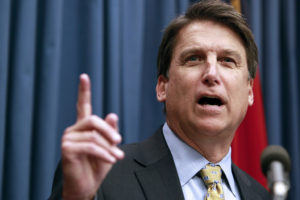It may sound premature, but the 2020 election cycle is upon us. Democrats are holding several rounds of debates as we inch closer to the official primary election season.
Simultaneously Republican officials in multiple states are covertly canceling their 2020 primary contests, not only to demonstrate support for President Donald Trump, but also to shun a few GOP challengers stepping forward to oppose the party’s nomination – former Massachusetts Governor Bill Weld, former Rep. Joe Walsh, and embattled South Carolina Governor Mark Sanford. All long shots, but certainly aren’t nobodies.
Governor Sanford, who could perform very well in a South Carolina primary, which could deliver early momentum to his bid for the nomination, most likely won’t have the opportunity. The state Republican parties in South Carolina, Kansas, Nevada, Arizona, and Alaska could prohibit their caucuses and primaries.
The move is not unprecedented when a political party feels the incumbent is strong and the likely outcome appears relatively clear. South Carolina and Arizona Republican parties cancelled primaries in 1984 and 2004 when Reagan and Bush, respectively, were seeking re-election. Democrats terminated over 10 primary contests in 2012.
The RNC has made it apparent Trump has their “undivided support” well before he’s the party’s official nominee.
Despite the precedent, Trump has been a political lightening rod for the GOP and the country at-large, not holding primary contests will continue to divide the party and frustrate the country. Trump has disrupted a long tradition of Republican leadership and policy, while introducing an entirely new standard of presidential behavior.
POTUS routinely tweet various polls stating his popularity, so Trump should have nothing to fear in primaries, and embrace the competition.
It’s striking former Massachusetts Governor, 2012 Republican presidential nominee, and Utah Senator Mitt Romney publicly declared he will not endorse Trump for a second term.
Not to mention, in the aforementioned cases where both parties have cancelled primary contests; the decision was mostly driven by little discernible interest by voters in holding them. That isn’t true this season.
While Republicans shore up the rank and file to support their incumbent, House Democrats are formally launching impeachment proceedings against President Donald Trump – highlighting the president’s Ukraine scandal as a “breach of his Constitutional responsibilities.”
House Speaker Nancy Pelosi has been under extreme pressure to unleash her party’s six committees to deeply investigate Trump. Undoubtedly Pelosi has resisted dozens of House Democrats for most of this year, but a change of heart came in the wake of reports that POTUS may have withheld critical aid to Ukraine to motivate officials there to investigate the son of Vice President Joe Biden.
More than 175 House Democrats support some type of impeachment action – more than three-quarters of the 235-member caucus.
Trump and other top Republicans will decry the impeachment inquiry as “fake news” or simply a “witch hunt” – but the process could yield a positive outcome for Democrats desperately wanting to remove Trump from office or possibly damage his re-election efforts.
We have a wide range of structural issues in our country – rising national debt, out of control fiscal spending, ineffective healthcare, a broken immigration system, uneven foreign trade, and growing threats from other global countries – there have been no other point in American history where voters need a robust debate about significant issues.
We not only must hear President Trump explain his position on these arguments to his fellow Republicans, but the entire country wants to better understand if he possesses a vision to lead us through and beyond these obstacles.


